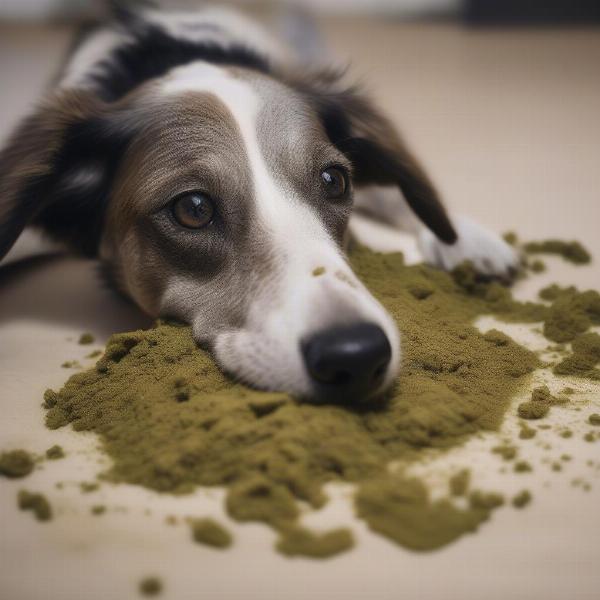Kelp seaweed powder for dogs has gained popularity as a nutritional supplement. But is it all it’s cracked up to be? This article dives deep into the potential benefits and risks of kelp for dogs, providing you with the information you need to make informed decisions about your furry friend’s diet. We’ll explore what kelp is, its nutritional composition, potential benefits, recommended dosage, and potential side effects.
Understanding Kelp Seaweed
Kelp is a type of large brown algae that grows in cold, nutrient-rich waters around the world. It’s a powerhouse of vitamins and minerals, making it a popular supplement not only for humans but also for our canine companions. Kelp is a natural source of iodine, which is essential for thyroid function. It also contains other important nutrients like iron, magnesium, potassium, and vitamins A, C, and K.
Nutritional Benefits of Kelp Seaweed Powder for Dogs
Adding kelp seaweed powder to your dog’s food can offer several potential benefits. It’s a natural source of iodine, crucial for maintaining a healthy thyroid, which regulates metabolism and hormone production. A deficiency in iodine can lead to hypothyroidism, a condition that can cause weight gain, lethargy, and skin problems. Kelp also contains antioxidants, which can help protect cells from damage caused by free radicals.
Supporting Thyroid Health with Kelp
As mentioned earlier, kelp is a rich source of iodine, which is essential for proper thyroid function. A healthy thyroid is crucial for regulating metabolism, hormone production, and overall well-being. Supplementing with kelp can help ensure your dog gets enough iodine, especially if their diet is lacking in this essential nutrient.
 Dog eating food supplemented with kelp powder
Dog eating food supplemented with kelp powder
Boosting the Immune System with Kelp’s Antioxidants
Kelp is packed with antioxidants, including vitamins A, C, and E, as well as various carotenoids. These antioxidants can help protect your dog’s cells from damage caused by free radicals, unstable molecules that can contribute to aging and various health problems. A strong immune system is essential for fighting off infections and diseases.
How Much Kelp Should You Give Your Dog?
The appropriate dosage of kelp seaweed powder for dogs depends on factors like their size, age, and overall health. It’s always best to consult with your veterinarian before adding any supplements to your dog’s diet. They can help you determine the correct dosage and ensure it won’t interact with any existing medications. Generally, a small amount is all that’s needed. Too much kelp can lead to an iodine overdose, which can be harmful.
Consulting Your Veterinarian for Dosage Guidance
Before adding any new supplement to your dog’s diet, it’s crucial to talk to your veterinarian. They can assess your dog’s individual needs and determine the appropriate dosage of kelp. They can also advise you on potential interactions with any medications your dog is currently taking.
Potential Side Effects of Kelp for Dogs
While kelp is generally considered safe for dogs, it’s important to be aware of potential side effects. Giving too much kelp can lead to an iodine overdose, which can cause symptoms like vomiting, diarrhea, and increased thirst. It’s also possible for dogs to be allergic to kelp, so start with a small amount and monitor for any allergic reactions, such as itching, skin redness, or digestive upset.
Conclusion
Kelp seaweed powder can be a beneficial supplement for dogs, offering a natural source of essential nutrients like iodine and antioxidants. However, it’s crucial to consult your veterinarian before adding kelp to your dog’s diet to determine the appropriate dosage and ensure it’s safe for your furry friend. Remember to start with a small amount and monitor for any potential side effects. With careful consideration and guidance from your vet, kelp can be a valuable addition to your dog’s overall health and well-being.
FAQ
- Is kelp seaweed powder safe for all dogs? While generally safe, consult your vet before adding kelp, especially if your dog has pre-existing conditions.
- What are the signs of iodine overdose in dogs? Symptoms can include vomiting, diarrhea, and increased thirst.
- Can kelp help with my dog’s skin problems? While anecdotal evidence suggests benefits, more research is needed. Consult your vet.
- How do I store kelp seaweed powder? Store in a cool, dry place away from direct sunlight.
- Can I give my puppy kelp? Consult your veterinarian for appropriate dosage for puppies.
- What if my dog doesn’t like the taste of kelp? Try mixing it with a small amount of wet food.
- Are there any alternatives to kelp seaweed powder? Discuss alternative supplements with your vet.
Related Articles
About ILM Dog: ILM Dog is your go-to resource for expert advice on dog breeds, health, training, nutrition, grooming, and much more. We offer practical, reliable information for both new and experienced dog owners worldwide. From choosing the right breed to understanding your dog’s nutritional needs, we cover all aspects of dog care. Contact us for expert advice: Email: [email protected], Phone: +44 20-3965-8624.